AMD Ryzen 7 2700X Review: Redefining Ryzen
Why you can trust Tom's Hardware
Final Analysis
AMD's 2000-series processors aren't revolutionary, but they are far beyond the normal evolutionary updates we've become accustomed to over the last several years.
In the chart below, we plotted gaming performance with both average frame rates and a geometric mean of the 99th percentile frame times (a good indicator of smoothness), which we then converted into an FPS measurement. We're also presenting price-to-performance charts that get split up to include CPUs-only and extra platform costs. For the models that don't come with a bundled cooler, we add an extra $25 for a basic heat sink. We also add $20 if overclocking requires a more expensive motherboard (as is the case for Z370).
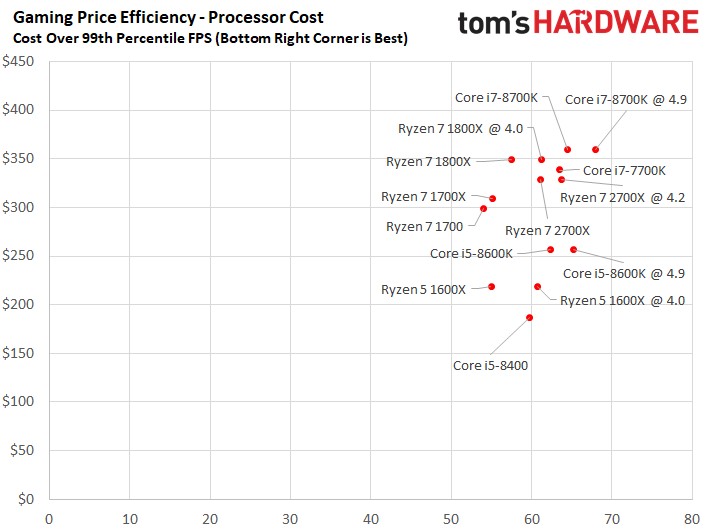
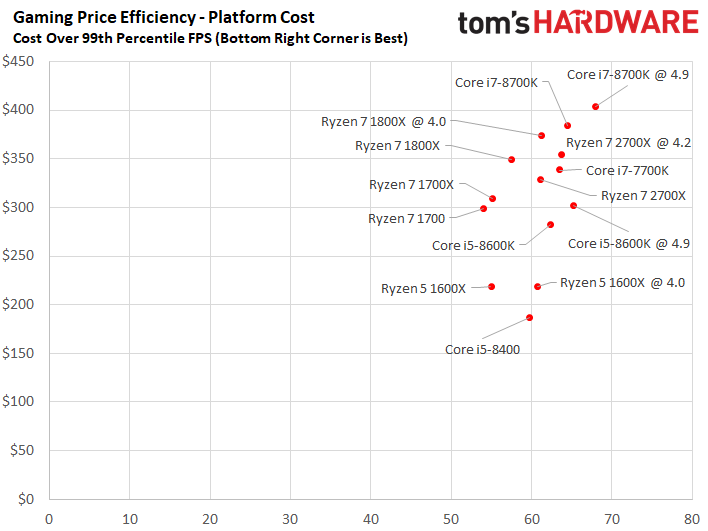
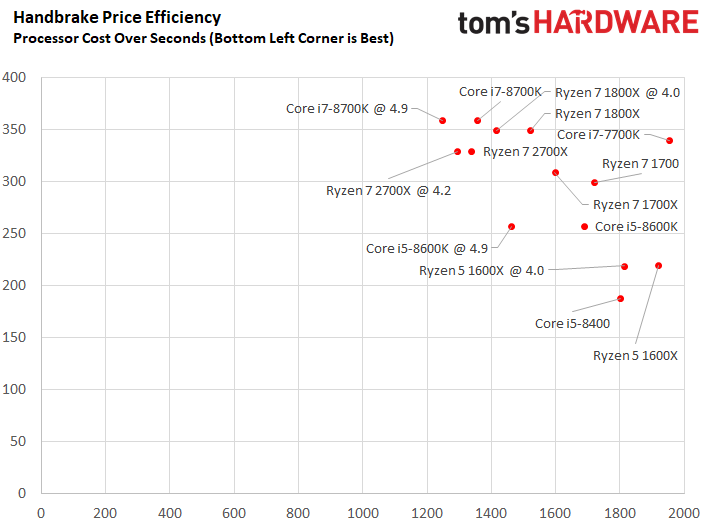
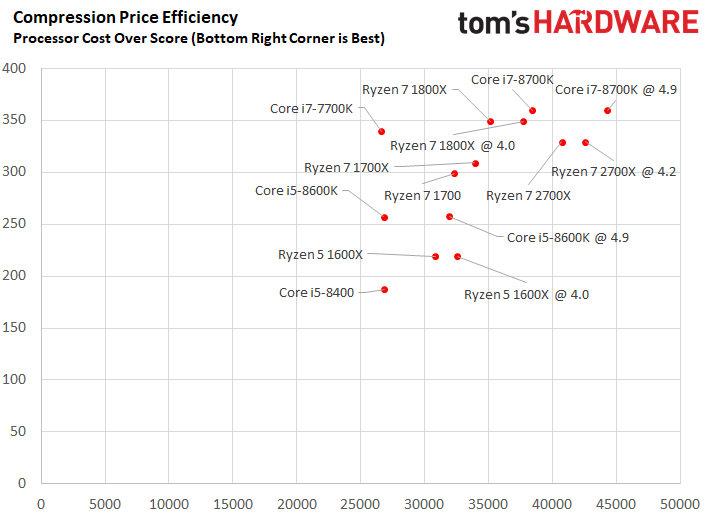
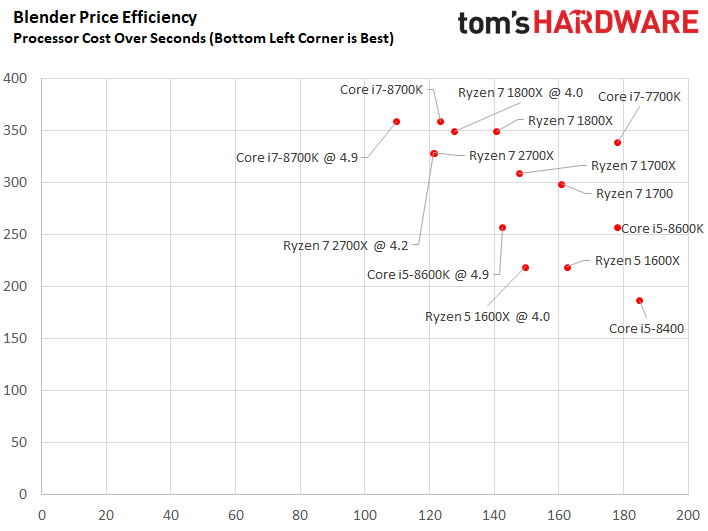
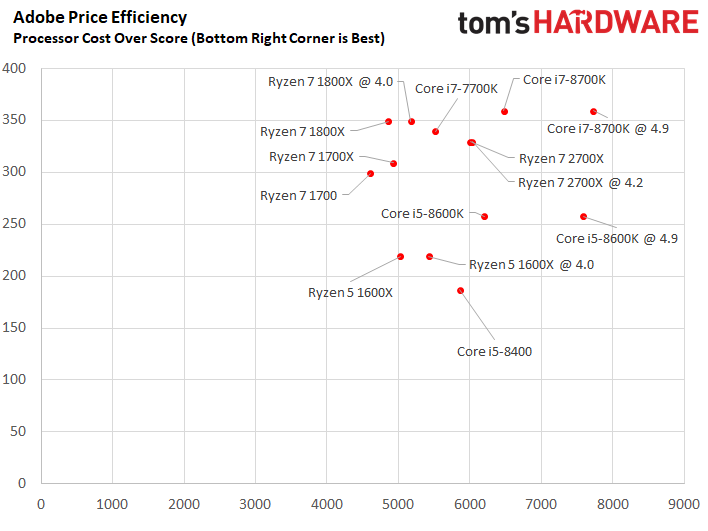
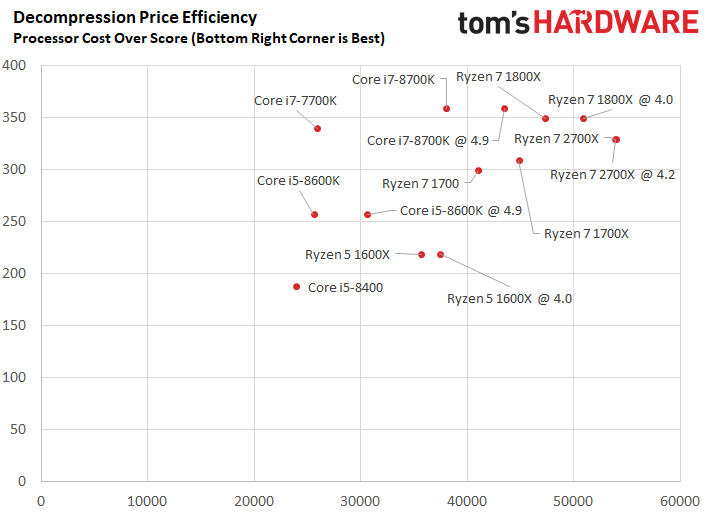
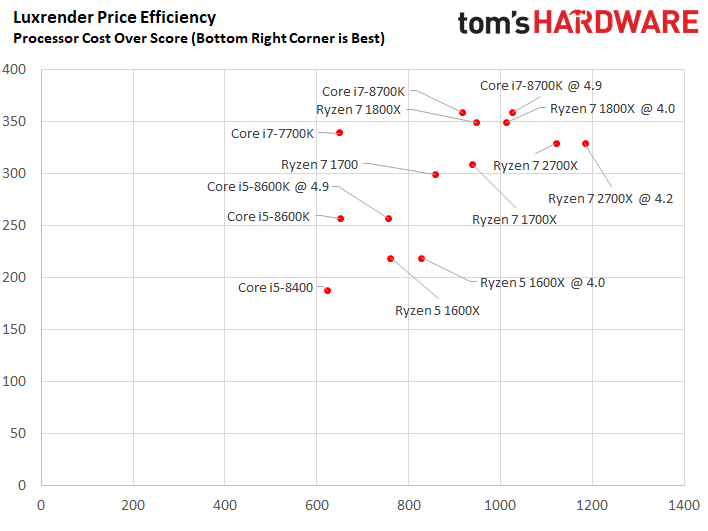
In gaming, AMD's stock Ryzen 7 2700X delivers a great performance boost that rivals its overclocked predecessor in every one of our tests. Tuning the 2700X provides additional performance, though you probably won't notice the difference. Check out our chart: as you can see, the Ryzen 7 2700X effectively ties Core i7-8700K based on the geometric mean. But it sells at a $30 discount, drops into a less expensive motherboard, and comes with a thermal solution that adds even more value.
While the overclocked Core i7-8700K is a fierce competitor, it requires you to buy a Z-series motherboard for overclocking, along with a capable cooler. Core i5-8600K offers most of the -8700K's performance, but you lose Ryzen 7 2700X's sixteen threads and bundled heat sink/fan. We think it's safe to say that AMD is delivering on its pledge to provide a near-equivalent gaming experience in most titles.
If you're searching for a more productivity-oriented processor, Ryzen 7 2700X is incredibly attractive. It offers superior performance compared to the Core i7-8700K in many of our threaded tests, and is much more competitive in lightly threaded applications than previous-gen models.
AMD's Precision Boost 2 and XFR2 algorithms are already pushing the voltage/frequency curve to its limits, so don't expect much in the way of overclocking headroom. We did tune Ryzen 7 2700X up to 4.2 GHz, but a higher dual-core Precision Boost 2 frequency of 4.3 GHz offers better performance than our all-core overclock in certain applications. Significant gains in games were likely a result of heightened sensitivity to our DDR4-3466 memory.
AMD's latest Ryzen 7 delivers a host of features that make enthusiasts swoon, such as an unlocked multiplier, backward compatibility with 300-series motherboards, solder between the heat spreader and die, and an LED-equipped cooler. We only wish that B450-based motherboards were available at launch time. Hopefully we hear more about AMD's lower-cost platform soon.
Get Tom's Hardware's best news and in-depth reviews, straight to your inbox.
In a broader sense, AMD is delivering on its first update to the Ryzen processor series, proving that it can execute on its roadmap. It looks like it's going to be another busy year in the CPU space--and that's more good news for enthusiasts and gamers.
MORE: Best CPUs
MORE: Intel & AMD Processor Hierarchy
MORE: All CPUs Content

Paul Alcorn is the Editor-in-Chief for Tom's Hardware US. He also writes news and reviews on CPUs, storage, and enterprise hardware.
-
Ninjawithagun Once again, Tom's provides an incorrect comparison in this review. Intel's 8700K is comparable to the 2600 or 2600X and NOT the 2700 or 2700X. Just count the number of cores and threads and one should be able to figure that out O.oReply
Whine all you want. Just because you down vote me only means you don't know how to read or count :P -
Sakkura Reply20899022 said:Once again, Tom's provides an incorrect comparison in this review. Intel's 8700K is comparable to the 2600 or 2600X and NOT the 2700 or 2700X. Just count the number of cores and threads and one should be able to figure that out O.o
The 2700X costs $329, the 8700K costs $359. It is a very reasonable comparison to make. -
justin.m.beauvais It sure is nice to see an AMD chip up there in the thick of it with Intel's best offerings. Competition has finally officially returned. I'm impressed that AMD gained so much ground and managed to make the price more competitive than the 1800x was. It is slightly disappointing that overclocking remains less impressive than the Intel offerings, but everything else sort of makes up for that.Reply
I didn't feel like AMD was quite "there" yet with the 1000 Ryzens, but with the 2000 series I feel like we can finally say that they have arrived. -
Ninjawithagun Reply20899035 said:20899022 said:Once again, Tom's provides an incorrect comparison in this review. Intel's 8700K is comparable to the 2600 or 2600X and NOT the 2700 or 2700X. Just count the number of cores and threads and one should be able to figure that out O.o
The 2700X costs $329, the 8700K costs $359. It is a very reasonable comparison to make.
Incorrect. It has nothing to do with price. Comparing like CPU architectures is the only logical course of action. 6 core/12 thread vs 8 core/16 thread makes no sense. Comparing the Intel 8700K 6 core/12 thread @ $347 to the AMD 2600X 6 core/12 thread @ $229.99 makes the most sense here. Once the proper math is done, AMD destroys Intel in performance vs. cost, especially when you game at any resolution higher than 1080P. The GPU becomes the bottleneck at that point, negating any IPC benefits of the Intel CPUs. I know this how? Simple. I also own a 8700K gaming PC ;-)
Once again, whine all you want. Just because you down vote me only means you don't know how to read or count :P -
bfwhsm Now, do the tests again with meltdown/spectre applied on intel cpus, as you should.Reply
And you will see a VERY different story, with 2700k destroying 8700k in almost every measure).
(check out anandtech's review to get an idea) -
Ninjawithagun Reply20899131 said:Now, do the tests again with meltdown/spectre applied on intel cpus, as you should.
And you will see a VERY different story, with 2700k destroying 8700k in almost every measure).
(check out anandtech's review to get an idea)
I will definitely check out that review as well. Thanks bfwhsm! -
tripleX Reply20899131 said:Now, do the tests again with meltdown/spectre applied on intel cpus, as you should.
And you will see a VERY different story, with 2700k destroying 8700k in almost every measure).
(check out anandtech's review to get an idea)
Maybe you should read the comments on the AnandTech article. They all point out that the test results don't match any other site's results. -
Sakkura Reply20899157 said:20899131 said:Now, do the tests again with meltdown/spectre applied on intel cpus, as you should.
And you will see a VERY different story, with 2700k destroying 8700k in almost every measure).
(check out anandtech's review to get an idea)
Maybe you should read the comments on the AnandTech article. They all point out that the test results don't match any other site's results.
... because of the different testing procedure that he just referred to.